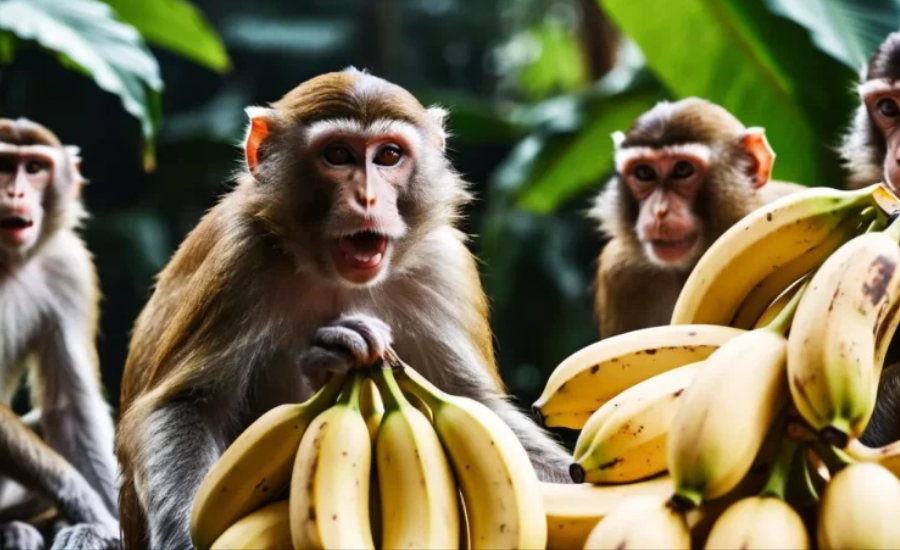Understanding the Concept of Banana B4hnuk08dew=Monkey
October 22, 2024

Bananas have always been closely associated with monkeys in popular culture. This article dives into the concept behind the unique keyword “banana b4hnuk08dew=monkey,” examining its potential meaning and relevance. While the keyword itself seems random and technical, we’ll explore the underlying associations between bananas and monkeys and how this quirky term might fit into digital landscapes. If you’re curious about this phrase, read on as we break it down in detail.
The Connection Between Bananas and Monkeys
Bananas and monkeys have been intertwined for generations, with monkeys often depicted as lovers of bananas in cartoons, commercials, and even nature documentaries. In reality, the association stems from a few key factors:
- Diet and Behavior: Many species of monkeys do consume bananas, although their diet is much more diverse, including fruits, leaves, and small insects. Bananas are a convenient symbol because they are easy to visualize and represent the broader concept of a monkey’s fruit-based diet.
- Cultural Representation: Pop culture has exaggerated the relationship between monkeys and bananas to a point where it’s almost a stereotype. This has been reinforced by numerous films, animations, and even video games.
- Symbolic Appeal: Bananas are often used as a symbol of simplicity and fun, much like monkeys are seen as playful animals. This reinforces the bond between the two in both media and everyday conversation.
What Does “Banana B4hnuk08dew=Monkey” Mean?
Now, let’s dissect the keyword “banana b4hnuk08dew=monkey.” At first glance, it looks like a string of random characters. However, in the world of SEO and digital algorithms, unique keywords like this can have several meanings or purposes.
1. Unique Identifier
The string “b4hnuk08dew” within the keyword might serve as a unique identifier for an internal system, website algorithm, or database. This is not uncommon when it comes to online content, where unique strings help differentiate specific data entries or tags. In this case, the association between “banana” and “monkey” could be linked through this specific identifier to serve a particular search or reference purpose.
2. Experimental SEO Keyword
Another plausible explanation for this keyword is that it’s an experimental SEO term. Sometimes, businesses or content creators use highly specific or obscure terms to test how search engines index their pages. “Banana b4hnuk08dew=monkey” could be an intentional experiment designed to see how well the keyword ranks or gains traction over time.
3. Metaphorical Meaning
Although speculative, it’s possible the keyword is metaphorical. “Banana” and “monkey” could represent simplicity and playfulness, while the random string “b4hnuk08dew” might add an element of complexity or uniqueness. This blend of elements could symbolize the relationship between something simple and fun becoming more complex in certain contexts, such as digital environments.
The Role of Random Keywords in SEO
Random keywords like “banana b4hnuk08dew=monkey” serve a specific role in the SEO landscape. While traditional SEO focuses on more common search terms, long-tail keywords or unique strings can help websites capture niche search traffic. Here’s why such keywords are valuable:
1. Targeting Niche Audiences
With common keywords being highly competitive, businesses often struggle to rank for them. A unique keyword like “banana b4hnuk08dew=monkey” may attract a very specific audience, which could lead to higher engagement rates. Niche audiences are usually more invested in the content they search for, and specific keywords can cater to their needs.
2. Lower Competition
Due to their uniqueness, random keywords face less competition. Search engines may find it easier to rank content with rare keywords because fewer pages compete for those search terms. This gives content creators an advantage in standing out in search results.
3. Testing Search Algorithms
By using unconventional keywords, SEO experts can test how search engine algorithms respond. Keywords like “banana b4hnuk08dew=monkey” can reveal insights about indexing, ranking factors, and how easily search engines interpret strings with unusual combinations of words and numbers.
FAQs About Banana B4hnuk08dew=Monkey
Q: Is “banana b4hnuk08dew=monkey” a common keyword?
A: No, it’s not a common keyword. It’s likely a unique or experimental phrase used for specific SEO purposes or internal system identification.
Q: What does the random string in the keyword mean?
A: The string “b4hnuk08dew” could serve as an internal identifier, or it may have been chosen for SEO experimentation. Its precise meaning likely depends on the context in which it’s being used.
Q: Why are bananas often associated with monkeys?
A: Bananas have become synonymous with monkeys due to cultural representations in media, despite monkeys having a diverse diet that extends beyond bananas.
Q: Can random keywords help improve SEO performance?
A: Yes, random keywords, especially long-tail ones like “banana b4hnuk08dew=monkey,” can help improve SEO performance by targeting niche audiences and lowering competition.
Q: How do search engines handle unusual keywords like this?
A: Search engines index and rank pages based on their relevance, keyword usage, and other factors. Unique keywords are treated just like any other, but their low competition can sometimes boost a page’s ranking more quickly.
Conclusion
The keyword “banana b4hnuk08dew=monkey” might seem odd at first glance, but it offers an interesting perspective on SEO, niche keyword targeting, and the playful connection between bananas and monkeys in culture. Whether used as an SEO experiment or as a metaphorical phrase, understanding its potential impact in the digital world gives us insight into how specific and unique search terms can shape web traffic and content discovery.